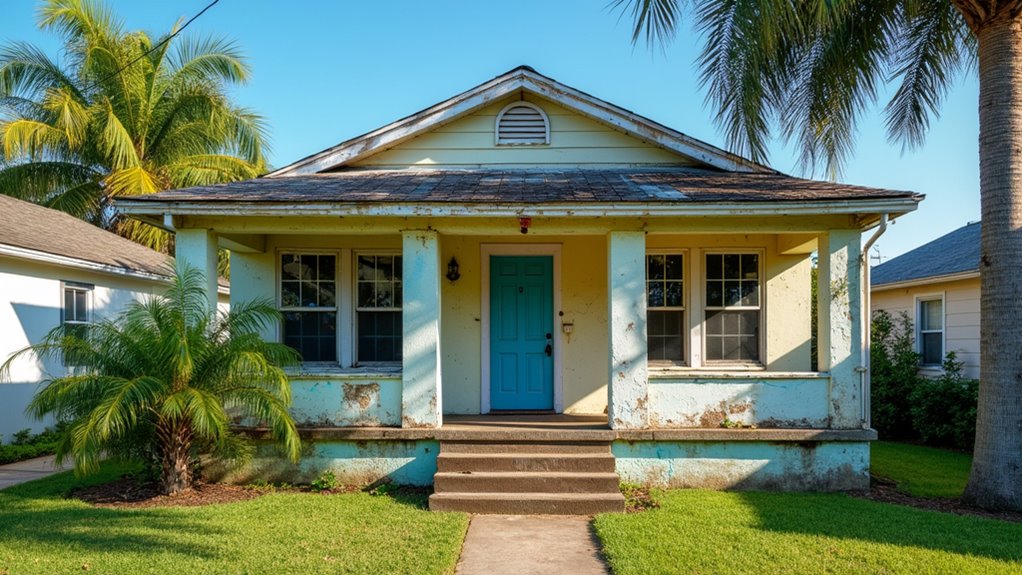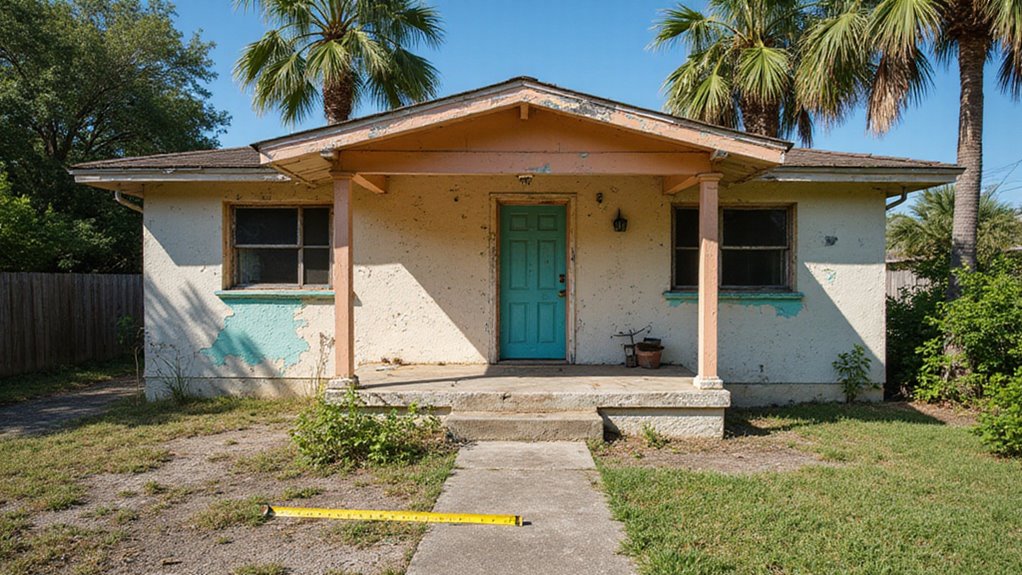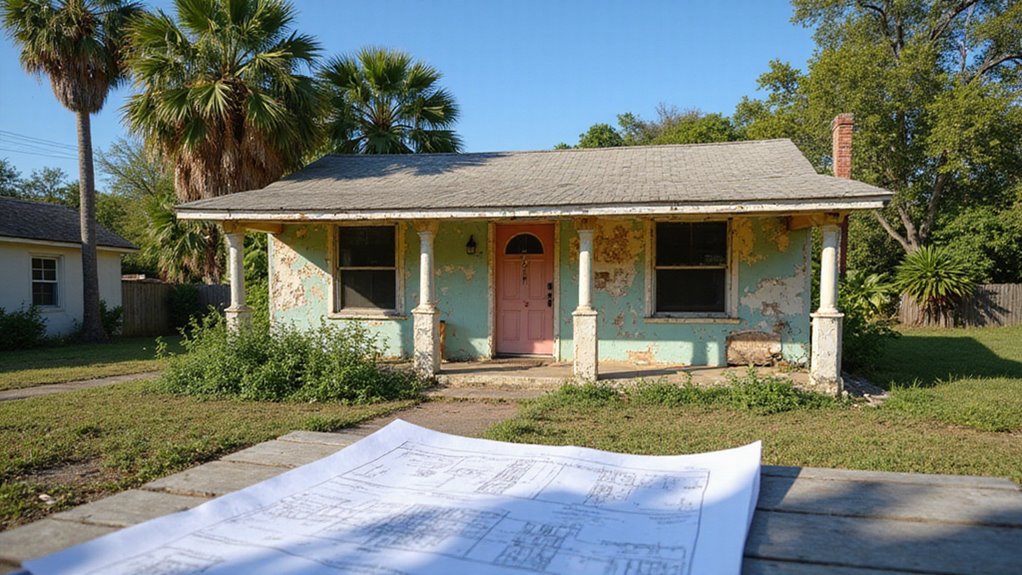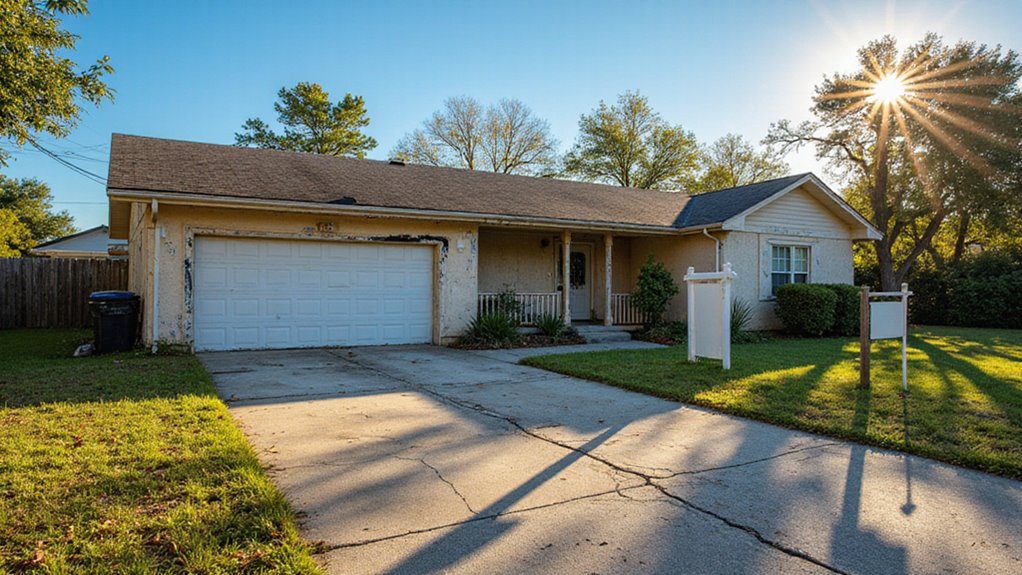Have you inherited property in Florida and now face a tough choice? Deciding whether to renovate before selling is tricky. Florida’s booming market can mean big profits, but the wrong move could cost you.
Renovations might boost your sale price, but they’re not cheap. The costs and time can quickly add up. Uncertainty about returns can make this decision stressful. Don’t worry, there’s a way to navigate this challenge.
Renovating before selling in Florida can be smart if planned well. This guide will help you weigh risks and rewards. This blog will break down key factors to help solve your dilemma.
Key Takeaways
- Renovating can increase property value and attract buyers in Florida’s competitive market.
- High renovation costs may not be fully recovered in the sale price.
- Selling as-is avoids upfront costs and speeds up the closing process.
- Emotional attachments might lead to overspending on unnecessary upgrades.
- Consult local agents to assess market trends before deciding.
Understanding the Florida Real Estate Market

As you prepare to sell your inherited property in Florida, it’s critical to grasp the key trends shaping the housing market. You’ll need to analyze whether it’s currently a seller’s market, with high demand and rising prices, or a buyer’s market, where supply exceeds interest. Understanding this balance can guide your renovation decisions and pricing strategy for maximum return. Additionally, working with a local real estate agent can provide valuable market knowledge to help set the right price for your property.
Key trends in Florida’s housing market
Florida’s housing market is active and influenced by high demand and varied buyers. Remote migration is a key trend as people move for lifestyle and work-from-home options. This movement raises property prices, especially in suburban and coastal spots.
Another important trend is the rise in demand for eco-friendly homes. Buyers want energy-efficient designs and sustainable materials to support environmental goals. If you’re selling, meeting these preferences could attract more interest.
Understanding these trends can help you sell inherited property effectively. If you make small updates or use smart marketing, your property may stand out. This approach keeps you competitive in Florida’s fast-changing real estate market.
Is it a seller’s or buyer’s market?
Florida’s real estate market can favor sellers or buyers based on key signs. If homes sell fast with low inventory, it’s a seller’s market. If inventory is high and homes linger, buyers hold the advantage.
Check how many homes are for sale in your area. Low supply often means sellers can set higher prices. High supply could force sellers to lower their offers.
Interest rates impact buyer affordability in Florida. If rates rise, fewer people can buy, helping buyers negotiate. If rates drop, demand may favor sellers.
Florida’s job growth and migration can shift the market. Strong growth often boosts demand, benefiting sellers. If growth slows, buyers might gain power.
Consult local real estate agents for current data. They can clarify if it’s a seller’s or buyer’s market. This helps with pricing or buying decisions.
The Pros of Renovating an Inherited Property
When you renovate an inherited property in Florida, you’re likely to see a significant boost in its market value, making it a more lucrative asset. These upgrades can also draw in a wider range of potential buyers, increasing your chances of a quick sale. Additionally, a well-renovated home stands out in listings, enhancing its marketability and setting it apart from competing properties. Focusing on cost-effective upgrades can maximize your return without overcapitalizing on the property.
Increased property value
Renovating an inherited property in Florida can greatly increase its value. Strategic updates make your home more appealing to buyers. If you focus on key improvements, the market worth rises significantly.
Consider adding sustainable features like energy-efficient appliances or solar panels. These upgrades cut utility costs for future owners. If buyers value eco-friendly homes, they may pay more for yours.
Florida’s demographic shifts include retirees and young families moving in. Tailor renovations, like accessible bathrooms, to meet their needs. If you match these trends, your property could sell for a higher price.
Targeted improvements ensure a better return on your renovation costs. A higher selling price becomes likely with smart updates. If planned well, your investment in the property will pay off.
Attracting a larger pool of buyers
Attracting a larger pool of buyers starts with renovating your inherited property in Florida. A updated home grabs attention in a busy market. It appeals to many, from young families to retirees.
Renovations make a home move-in ready for potential buyers. If you update key areas, buyers won’t hesitate to purchase. This eliminates doubts about fixer-uppers.
Modern marketing tools also help reach more people. Virtual Showings let out-of-state buyers tour your property online. If paired with Social Campaigns, your audience grows fast.
Targeted ads on Instagram or Facebook boost visibility. More eyes on your listing mean better chances of selling. If marketed well, your property stands out.
Better marketability
Renovating your inherited Florida property can make it highly marketable. A modern, updated look attracts more buyers easily. If you refresh the spaces, the home becomes move-in ready, which buyers love.
This upgrade can lead to faster sales and better offers. If the property looks appealing, buyers may pay more. Modernizing isn’t just about looks; it’s about offering a desirable home.
Use Virtual Tours to display the renovated property online. Buyers can explore every detail from anywhere conveniently. If you add this, more people will notice your listing quickly.
Pair this with Social Advertising to reach a larger audience. Target platforms where buyers often search for homes. If used well, these tools boost visibility significantly.
The Cons of Renovating an Inherited Property
As you consider renovating an inherited property in Florida, recognize that the upfront costs can be substantial, often straining your budget before any return is realized. You’ll also find the process incredibly time-consuming, requiring significant effort and coordination that might delay your plans to sell. Beyond logistics, be mindful of emotional attachments to the property, as they can cloud your judgment and lead to overspending on unnecessary upgrades. Additionally, navigating the probate process in Florida can further complicate and delay your renovation and selling timeline.
High upfront costs
Renovating an inherited property in Florida often brings high upfront costs. Homeowners face big expenses for materials, labor, and permits. These costs can strain your budget if not planned well.
Unexpected issues like mold or old wiring might increase expenses. Such problems can quickly drain your savings. If you’re unprepared, financial stress could grow.
Market changes may lower the property’s value over time. This makes your investment riskier than expected. If returns aren’t certain, the loss could be significant.
Securing loans or using personal funds adds extra pressure. Returns might not be guaranteed in Florida’s tough market. If gains are low, the costs could outweigh benefits.
Carefully check your finances before starting renovations. High upfront costs might overshadow potential profits. If risks seem high, rethink your plan.
Time-consuming process
Renovating an inherited property in Florida takes a lot of time. You will spend hours managing contractors and delays. If the property is far, daily commutes can drain your schedule further.
Travel planning for site visits or material pickups adds more work. You might struggle to balance this with your job. If personal commitments clash, your availability could shrink fast.
Consider if the renovation’s return justifies your time investment. Such projects often feel more exhausting than expected. If unsure, think about hiring help to ease the burden.
Emotional attachment and its impact
Dealing with an inherited property in Florida can bring strong emotions. These feelings often make the renovation process harder. If you’re attached, changing the home might feel wrong.
Attachment to the home comes from deep memories with family. You might worry that updates could erase your past. This bond can create hesitation even if renovations increase value.
Memories of loved ones in each room can hurt to change. Fear of losing a connection to history often arises. Guilt may surface if profit seems more important than legacy.
These emotions can confuse your choices during renovation. If feelings overwhelm you, delays or indecision might cost money. Clear thinking becomes tough under emotional stress.
Factors to Consider Before Renovating
Before you start renovating an inherited property in Florida, take a hard look at its current condition to determine what repairs or upgrades are truly necessary. You’ll also need to weigh the cost of renovations against the potential profit, ensuring the investment makes financial sense for the sale. Finally, consider your timeline and financial capacity, as these will dictate how much you can realistically tackle before listing the property. Consulting a qualified appraiser for a fair market valuation can help guide your decision on whether renovations will increase the property’s value significantly.
The current state of the property
Evaluating the condition of your inherited Florida property is vital before planning renovations. A detailed Property Assessment shows issues like foundation cracks or old wiring. It also highlights Historical Features that might add value.
The property’s condition can reveal if its structure is strong. If hidden problems exist, they could cost more to fix. You must know these details to plan wisely.
Your emotions might affect decisions about the property. If family memories linger in a worn kitchen, letting go is hard. Seeing crumbling walls that sheltered loved ones may cause pain.
Historical details in the property could be worth saving. If they hold special charm, consider keeping them during renovations. Think objectively to match your goals with these choices.
The cost of renovation vs. potential profit
Renovating an inherited Florida property can be a smart move if costs are managed well. Start by getting clear estimates for repairs or upgrades. If expenses are too high, the profit might not be worth it.
Next, compare renovation costs to the expected increase in property value. Will the upgrades bring a good return, or just break even? Research recent sales of similar homes to predict your outcome.
Focus on high-impact changes like kitchen updates or better curb appeal. Not all renovations guarantee higher offers in Florida’s market. If the cost outweighs profit, reconsider your plan.
Weigh all factors before deciding to spend on upgrades. A careful balance ensures a profitable result. If unsure, consult local experts for advice.
Your timeline and financial capacity
Planning to renovate an inherited property in Florida requires assessing your timeline and funds. Consider how much time you can give to this project. If rushed, the quality might suffer.
Think about the emotional impact of renovating this property. Could the stress of costs affect your well-being? If delays happen, they might disrupt other life plans.
Evaluate your budget before starting the renovation. Do you have enough money, or will you need savings? If funds are tight, the burden might outweigh the joy. Analyze your situation with a clear mind. Ensure the decision fits your future goals. If unsure, take time to decide.
Renovation vs. Selling As-Is
When deciding whether to renovate your inherited property in Florida, you might find that selling as-is makes more sense, especially if the home needs extensive repairs or if you’re short on time and funds. Opting to sell without updates can save you the hassle of managing renovations and often attracts investors or buyers looking for a fixer-upper at a lower price. In Florida’s competitive market, selling as-is can also mean a quicker closing, letting you move on without the burden of costly improvements. Additionally, selling as-is can expedite the process by eliminating repair negotiations and renovation delays, which is ideal for those under time pressure.
When it’s better to sell without renovations
Selling an inherited property in Florida without renovations can be a wise choice. Sometimes, the costs might exceed the benefits. If appraisals undervalue upgrades, you may lose money on investments.
Renovations can also bring unexpected risks and issues. Hidden problems might surface during repairs, increasing your expenses. If this happens, financial strain could become a burden.
Selling as-is helps avoid emotional stress and saves effort. You can preserve the home’s memories without changes. If time matters, this option lets you move on quickly.
Consider your unique situation before deciding on renovations. Skipping updates might be the easier path for you. If stress is a concern, selling without repairs could help.
Advantages of selling as-is in Florida
Selling an inherited property as-is in Florida comes with clear advantages. This approach saves you time in a busy market. If you choose a quick sale, you can avoid long delays.
Florida’s real estate often attracts buyers seeking fixer-uppers. You can sell fast without spending on repairs. If renovations aren’t an option, this works well for you.
Selling as-is also means minimal hassle on your end. You won’t need to handle contractors or unexpected costs. If stress is a concern, this path simplifies everything.
This method streamlines the entire selling process significantly. You reduce workload and avoid property upgrade stress. If speed matters, Florida’s demand supports your decision.
Cost of Renovations in Florida

As you plan to renovate an inherited property in Florida, understanding the average costs for common upgrades like kitchen remodels or bathroom updates is crucial, with prices often ranging from $10,000 to $50,000 depending on scope and materials. You’ll also need to factor in Florida’s unique climate challenges, such as humidity and hurricane risks, which can drive up expenses for durable materials and storm-proofing. Consider the typical home styles in the area, like stucco exteriors or ranch designs, as they often require specific maintenance or modern touches to attract buyers. Additionally, upgrading to energy-efficient windows can enhance property value and appeal to buyers concerned with energy savings in Florida’s hot climate.
Average costs for common renovations in Florida
Homeowners in Florida must know average renovation costs when preparing an inherited property for sale. Costs vary by project size and location, so budgeting is key. If you plan wisely, you can avoid overspending.
Kitchen remodels typically cost between $20,000 and $50,000 in Florida. Bathroom updates range from $10,000 to $25,000 on average. Flooring replacements usually fall between $3,000 and $10,000.
Rising material prices can push renovation costs higher than expected. High energy costs may also add to your budget. If these factors apply, adjust your plans accordingly.
Renovations can honor a loved one’s home by boosting its value. They offer hope for a new family’s fresh start. If done well, upgrades bring pride in showcasing the property.
Analyze all costs to ensure a good return at closing. If investments are balanced, your efforts will pay off. Careful planning helps maximize profit.
Specific considerations for local climate and home types
Renovating an inherited property in Florida means addressing the state’s hot, humid climate. If you ignore this, your home may suffer from moisture damage. Strong materials can help resist heat and frequent storms.
Hurricanes are common, so you must install reinforced windows and sturdy roofing. If winds strike, these upgrades protect your home. Such changes increase costs but attract more buyers.
Many Florida homes, especially near the coast, have a Coastal Design. If your property matches this, use corrosion-resistant fixtures. Raised foundations can also prevent saltwater damage.
These specific updates tackle local challenges effectively. If you prioritize them, your home’s value will rise. This ensures durability and appeals to potential buyers.
Local Permits and Regulations
As you plan renovations for your inherited property in Florida, you’ll need to navigate the local permit process to ensure compliance with state and municipal rules. Understanding zoning laws is just as critical, since they dictate what changes you can legally make to the property. Make sure you research these regulations thoroughly to avoid costly delays or penalties during your project. Additionally, consider how renovations might impact the stepped-up basis of the property for tax purposes when selling.
Understanding the permit process in Florida
Renovating an inherited property in Florida requires following local rules. Start by checking your county’s building department guidelines. If unsure, contact them for clear instructions.
Managing permits is key to avoid fines or delays. Use online systems for quick application submissions in many areas. If a permit gets denied, file an appeal with proper documents.
Renovations can feel stressful when timelines get delayed. However, securing permits offers great relief and security. Completing legal work builds pride in your efforts.
Stay ahead by reviewing specific regulations early on. Submit all applications as soon as possible. Keep detailed records to protect your investment.
What you need to know about zoning laws
Zoning laws are crucial when renovating an inherited property in Florida. They control what you can do with your home. If ignored, they can disrupt your plans.
Florida’s zoning rules balance growth and community needs. Check local codes before starting any renovation work. If rules change, staying updated helps avoid issues.
Some properties fall under Historic Zoning with strict guidelines. These rules protect old architecture and must be followed. If violated, you risk fines or project delays.
Contact your local zoning office for clear guidance. A professional can also assist with navigating these laws. Compliance saves time, money, and stress.
How to Maximize the Value of Your Renovation

When renovating your inherited property in Florida, you’ll want to target high-impact areas like the kitchen, bathrooms, and curb appeal to boost buyer interest. Make sure you’re balancing these upgrades with a realistic budget to avoid over-investing in features that won’t yield a strong return. By focusing on these priorities, you can strategically improve the property’s market value without breaking the bank. Additionally, small renovations like these can significantly enhance a home’s appeal to Florida cash buyers in a competitive market.
Focus on key areas: Kitchen, bathrooms, curb appeal
Start with the kitchen, bathroom, and curb appeal to attract buyers. These spaces create strong emotional connections if updated well. Focusing here can lead to better offers.
Kitchens should have open, practical layouts for family time. If you choose simple designs, they’ll feel inviting. This boosts the home’s warmth instantly.
Bathrooms need modern touches like sleek fixtures. Use neutral colors for a calm, spa-like vibe. If done right, they become relaxing spaces.
Enhance the exterior with fresh paint and neat landscaping. A great first impression matters to buyers. If improved, it sparks instant interest.
These upgrades make your property stand out. They can increase appeal to Florida buyers. If prioritized, your home’s value may rise.
Balancing upgrades with a realistic budget
Renovations can boost your inherited Florida property’s value if you balance upgrades with a realistic budget. Start by setting a clear spending limit to avoid financial stress. Research local trends to understand what buyers prioritize in your area.
A solid budget keeps your renovation on track without overspending. Decide how much you can afford before starting any work. If costs rise, cut back on non-essential upgrades to stay safe.
Focus on high-impact areas like kitchens and bathrooms for better returns. Avoid expensive luxury finishes if affordable options work well. If budget allows, add small updates to boost overall appeal.
When Not to Renovate
As you consider renovating your inherited property in Florida, it’s critical to weigh the financial strain and current market conditions before proceeding. You shouldn’t invest in upgrades if the costs outweigh potential returns, especially in a buyer’s market where competition is fierce. Recognize situations where renovating won’t pay off, like when minor fixes can achieve a comparable sale price without extensive work. Additionally, consider that the legal process of property inheritance may impact your timeline and budget for renovations.
Financial strain and market conditions
Deciding to renovate an inherited property in Florida requires careful thought. Consider if the costs could strain your finances. If inflation raises material and labor prices, can you handle the expense?
Market conditions in Florida matter a lot. If the real estate market is slow, renovations might not pay off. Check market trends before you invest.
Renovations can also bring emotional challenges. Stress may build from managing costs and market worries. If the market drops, debt could become a risk.
Uncertainty can make the process tough. Frustration grows when expenses climb due to inflation. Always review your budget first.
Analyze your finances and local data carefully. If risks seem high, wait for better conditions. This approach keeps you safe.
Situations where renovating doesn’t pay off
Renovating might not bring good returns when selling inherited property in Florida. If market trends could reverse soon, today’s popular upgrades may lose value fast. Spending on big changes like a kitchen redo might not attract buyers later.
Buyer fatigue can also hurt your investment in crowded markets. If every home has similar updates, yours won’t seem special. You should consider selling as-is to avoid extra costs in such cases.
Always check local data and buyer tastes before deciding to renovate. Don’t assume that upgrades will always mean profit. A quick sale might be smarter than a risky renovation.
The Emotional Aspect of Selling an Inherited Property

As you prepare to sell an inherited property in Florida, recognize that personal connections to the home can heavily influence your decisions, often clouding objective judgment. You’ll need to weigh the emotional attachment to memories or family history against the potential financial gain from a strategic sale. Striking this balance is crucial to ensure you’re making a choice that aligns with both your heart and your wallet. Additionally, the process of selling can bring immense emotional stress, especially when dealing with the loss of a cherished home.
How personal connections affect decisions
Personal connections deeply impact decisions about selling an inherited property in Florida. They blend emotions and social ties into your choices. If memories linger, they can make selling harder.
These connections often carry strong emotional weight. Family gatherings or a loved one’s presence might haunt you. If relatives push to keep the home, it adds stress.
Emotions can cloud your judgment during the selling process. If sentiment takes over, practical steps might be ignored. Weighing history against logic becomes a challenge.
If you face pressure from your social circle, decisions get tougher. Relatives might see the property as a legacy. This can delay or sway your final choice.
Finding a balance between emotional attachment and financial gain
Managing an inherited property in Florida involves personal feelings and financial goals. You might feel torn between memories and profit. Striking this balance means knowing the home’s worth versus its emotional value.
Consider what the property truly means to you. If you keep it, comfort may come at a high cost. Maintenance or missed sales could strain your finances.
Think about the emotional tradeoffs with a clear mind. List the pros and cons to see your priorities. If emotions outweigh money, holding on might be right.
Decide what matters most in this tough choice. Are you ready to let go for gain? Your decision should reflect both heart and mind.
The Tax Implications of Renovating and Selling
When you’re selling an inherited property in Florida, you’ve got to consider capital gains tax, which applies to the profit made from the sale based on the stepped-up basis at the time of inheritance. Renovations can increase the sale price, potentially raising your taxable gain, but they might also qualify for deductions if you track expenses carefully. Let’s examine how these factors interplay to impact your financial outcome.
Capital gains tax considerations in Florida
Handling capital gains tax in Florida matters when selling an inherited property. Florida has no state income tax, but federal tax applies on profit. This profit is the difference between sale price and stepped-up basis at inheritance.
You can lower taxes with exemptions if you lived in the property. Basis adjustment from inheritance also reduces your liability. Always check eligibility for these benefits to save money.
Unexpected tax bills might cause stress in your daily life. Navigating complex IRS rules can feel very frustrating. Yet, proper planning brings relief by minimizing your obligations.
Keeping informed protects your financial future. If you stay aware, surprises can be avoided. Plan ahead to ensure security.
How renovations affect the sale price and taxes
Renovations often increase the property’s market value, leading to a higher sale price. If the local assessor revalues the home, property taxes might rise after renovations. Consider if renovation costs and higher taxes outweigh the sale price gains.
Renovations can raise your property basis with documented costs, possibly lowering taxable gains. If you sell, this could save money on taxes. Always consult a tax professional for clarity.
Carefully weigh the financial pros and cons of renovating. If costs exceed benefits, it might not be worth it. Seek expert advice to make a smart choice.
Alternatives to Renovating

If you’re looking to avoid the hassle of renovating an inherited property in Florida, consider selling directly to cash home buyers who often purchase homes as-is for quick transactions. You can also consider selling to investors, as they frequently seek properties to flip or rent, potentially offering competitive prices without the need for repairs. Both options save you time and upfront costs, allowing a faster sale while sidestepping renovation challenges.
Selling to cash home buyers in Florida
Selling an inherited property in Florida can be easy with cash home buyers. These buyers focus on quick deals and don’t require any repairs. If you want speed, they often close fast without complications.
Cash buyers make negotiations simple based on your home’s current state. If repairs are a concern, you can avoid them completely. This option saves you from spending money on updates.
You can escape the stress of managing an inherited property. If time matters, cash buyers help you close swiftly. This lets you move forward without delays.
Analyze your needs before deciding on a cash sale. If you seek a no-fuss process, this could work well. Connect with trusted buyer networks for reliable offers.
Selling to investors
Selling to investors can be a smart choice for your inherited Florida property. This option helps you avoid costly renovations. Investors often buy homes as-is, saving you both time and effort.
If you choose this path, careful screening of investors is crucial. Always check their past deals and online reviews. This helps you avoid scams or unfair offers.
You should also ask about their funding sources before agreeing. Confirm they have the money to close the deal fast. This ensures a smooth and quick transaction.
Consulting a Real Estate Agent
When selling an inherited property in Florida, you’ll find a real estate agent’s expertise invaluable for handling market trends and pricing strategies. Start by researching agents with strong local knowledge and a proven track record in your area to ensure you’re partnering with someone who understands the unique challenges of inherited homes. Check reviews and ask for referrals to pinpoint the right professional who can guide you through the selling process with confidence.
Why an agent’s expertise is crucial
Selling an inherited property in Florida can be tricky, but an agent’s expertise makes it easier. They guide you through legal and financial steps with care. If family disputes arise, they help resolve conflicts smoothly.
An agent’s support brings comfort when you feel overwhelmed. Their market analysis saves you time and effort. You gain relief knowing they handle complex tasks.
With their help, you can price the property right. They build confidence by ensuring a fair deal. If negotiations get tough, their skills protect your interests.
Their insight helps you avoid costly mistakes. You can make smart choices with their advice. If issues pop up, they ensure a smoother sale.
How to find the right real estate agent in Florida
Finding the right real estate agent in Florida is key to selling your inherited property successfully. Start by checking their credentials to ensure they have experience with such properties. If they have good reviews, they might be reliable.
Next, ask for referrals from family or friends who have worked with agents. Their personal feedback can help you find a trustworthy professional. If possible, contact local real estate groups for recommendations too.
Finally, interview a few agents to understand their knowledge of Florida’s market. Assess how well they communicate and if they focus on your needs. If they align with your goals, they could be the right choice.
Conclusion
In conclusion, deciding whether to renovate an inherited Florida property before selling requires careful thought. If you renovate, you might increase the property’s value. However, if costs rise unexpectedly, it could become a financial burden.
If you prefer a quicker, hassle-free option, consider selling as-is. We buy houses for cash, ensuring a smooth and fast transaction. This way, you can avoid renovation stress entirely.
Should you want to sell without the hassle, reach out to us. We at Greg Buys Houses are ready to help. Contact us today for a fair cash offer.

